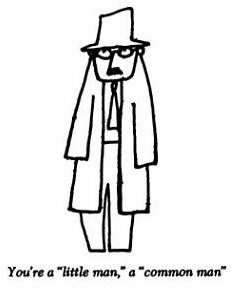By Susan de Muth
As President Donald J. Trump ushered in the era of ‘alternative facts’ with a brazen hatred for Truth, my imprint, Thin Man Press had the timely opportunity to publish ‘American Porn’, Heathcote Williams’s critique of contemporary and historical America which culminates with an incisive, unrestrained diatribe against Trump.
In his first weeks in office, President Trump has already exceeded even Williams’s most hyperbolic expectations. He has declared war on the media, sacked the Attorney General, banned Moslems from America (except the oil-rich Saudi variety), started to build a wall to keep the Mexicans out, put the phone down on the Australian prime minister, and held hands with Britain’s shameless new appeaser, Theresa May (whom Trump’s boorish aides mischievously re-branded ‘Teresa May’, a well-known porn star).
Millions around the world are rubbing their eyes and asking, ‘How did this happen?’. The sensible folk have taken to the streets to declare their innocence and, as I write, a global open letter condemning Trump’s policies has already garnered five million signatures.
The volcano of repressed hatred, xenophobia, frustration, self-interest, unrestrained greed, violence, and a primordial, animal, belief in the survival of the fittest, has blown its top at regular intervals throughout history, with devastating consequences. The question is, what can be done?
Some commentators, including John Pilger, have identified political or ideological reasons for the failures of liberalism, particularly in the West where we choose not to acknowledge that the veneer of ‘civilization’, and the charm and masterful oratory of leaders like President Obama, conceal a relentless violence against the poorest people on earth.
Paradoxically, Trump’s is probably the least dissembling face that we have ever seen in the White House.
Eighty years ago, the Austrian-born psychoanalyst Wilhelm Reich, went beyond politics to provide a compelling psychological and emotional explanation for our ready acceptance of the tyrant, and our collective failure to establish an administrative model for human society that works and is fair.
Reich wrote ‘The Mass Psychology of Fascism’ in 1933 and was forced to flee the Nazis in 1939, re-rooting himself in America. Here he attracted opprobrium with his ‘sex-pol’ theories (positing the orgasm as key to the liberation of human-kind from oppression and violence) and, as the rigid and oppressive conservatism of the so-called ‘McCarthy era’ reached its zenith, was openly persecuted. He was accused of insanity and fraudulent clinical practices; imprisoned in 1956, he died of a heart attack, still in jail, a year later.
‘Listen Little Man!’ (a long essay written in German in 1945) was his impassioned response to his own dilemma as he came under increasing public (and press) scrutiny, but is most remarkable, I find, for its unflinching confrontation of the traits in us all that allow dictators and oppressive leaders free passage to the top.
Reich speaks of the ‘little man’s ruinous craving for authority’ and his ultimate fear of freedom, even after a successful uprising. It is interesting to note that Steve Bannon, Trump’s right-hand man, has long described himself as ‘the patron saint of the commoner’. Writing as the full horrors of the Second World War became apparent, Reich’s observations offer a salutary warning against the possible outcomes of the wave of ‘populism’ we are witnessing today.
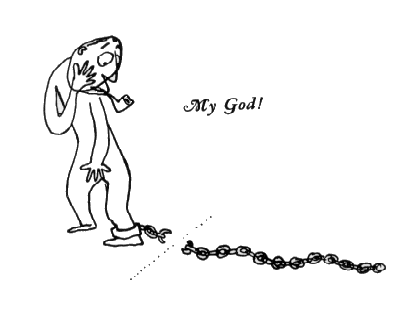
While recommending to the reader the entire essay – which is still in print and available in English, with beautiful illustrations by William Steig (some of which are reproduced in this article) — I have selected some extracts to share that I find meaningful both on a universal level and in the context of the current political climate in the West[i]:
(All extracts from translation by Ralph Manheim)
‘THEY CALL YOU Little Man, or Common Man. They say your day has dawned, the “Age of the Common Man”.
‘You don’t say that, little man. They do, the vice presidents of great nations, the labour leaders, the repentant sons of the bourgeoisie, the statesmen and philosophers…
‘For several decades now you have been taking over, throughout the world. The future of the human race depends on your thoughts and actions. But your teachers and masters don’t tell you how you really think and what you really are; no one dares to confront you with the one truth that might make you the unswerving master of your fate.
‘You are “free” in only one respect: free from the self-criticism that might help you to govern your own life…
‘You let the powerful demand power “for the little man”, but you yourself are silent. You provide powerful men with more power or choose weak, malignant men to represent you. And you discover too late that you are always the dupe.
‘For twenty-five years I’ve been speaking and writing in defence of your right to happiness in this world, condemning your inability to take what is your due, to secure what you won in bloody battles on the barricades of Paris and Vienna, in the American Civil War, in the Russian Revolution. Your Paris ended with Petain and Laval, your Vienna with Hitler, your Russia with Stalin, and your America may well end in the rule of the Ku Klux Klan!
‘…You’re afraid to think that you yourself — the man you feel yourself to be — might someday be different from what it is now: free rather than cowed, candid rather than scheming; capable of loving, not like a thief in the night but in broad daylight. You despise yourself, little man. You say “Who am I that I should have an opinion, govern my life, and call the world mine?”. You’re right: who are you to lay claim to your life? I will tell you who you are.
‘You differ from a great man in only one respect: the great man was once a very little man, but he developed one important quality: he recognized the smallness and narrowness of his thoughts and actions. Under the pressure of some task which meant a great deal to him, he learned to see how his smallness, his pettiness, endangered his happiness. In other words, a great man knows when and in what way he is a little man.
‘A little man does not know he is little and is afraid to know. He hides his pettiness and narrowness behind illusions of strength and greatness, someone else’s strength and greatness. He’s proud of his great generals but not of himself. He admires an idea he has not had, not one he has had. The less he understands something, the more firmly he believes in it. And the better he understands an idea, the less he believes in it.
‘You’ve been more successful in winning your freedom than in securing it for yourself and others. This I knew long ago. What I did not understand was why time and again, after fighting your way out of a swamp, you sank into a worse one. Then, groping and cautiously looking about me, I gradually found out what has enslaved you: YOUR SLAVE DRIVER IS YOU YOURSELF. No one is to blame for your slavery but you yourself. No one else, I say!
‘That’s news to you, isn’t it? Your liberators tell you that your oppressors are Wilhelm, Nicholas, Pope Gregory XXVIII, Morgan, Krupp, and Ford. And who are your liberators? Mussolini, Napoleon, Hitler, and Stalin.
‘I say: Only you yourself can be your liberator!’
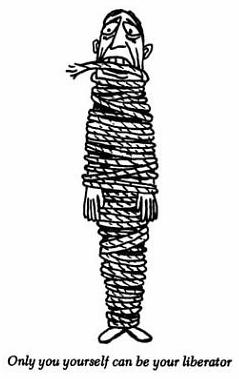
‘At this point I hesitate. I claim to be a fighter for purity and truth. But now, after resolving to tell you the truth about yourself, I hesitate for fear of you and your attitude toward the truth. Truth is dangerous when it concerns you. Truth can be salutary, but any mob can preempt it. If that were not so, you would not be where you are…
‘You’re not free, little man, and you haven’t the faintest idea what freedom is. You wouldn’t know how to live in freedom. Who brought the plague to power in Europe? You little man! And in America? Think of Wilson!
‘“Listen to him! He’s accusing me, the little man! Who am I? What power have I to interfere with the President of the United States? I do my duty and obey orders. I don’t meddle with politics.”
‘When you drag thousands of men, women, and children to the gas chambers, you’re only obeying orders. Is that right, little man? And you’re so innocent you don’t even know that such things are happening. And you’re only a poor devil, whose opinion counts for nothing, who hasn’t even got one. And who are you, anyway, that you should meddle with politics?

‘You listen only to bluster. And then you shout
Hurrah! Hurrah!
‘I know, I know! I’ve heard all that many times. But then I ask: Why don’t you do your duty in silence when a wise man tells you that you and you alone are responsible for what you do, or tries to persuade you not to beat your children, or pleads with you for the thousandth time to stop obeying dictators? What becomes of your duty, your innocent obedience, then? No, little man, when truth speaks, you don’t listen. You listen only to bluster. And then you shout Hurrah! Hurrah!
‘You’re cowardly and cruel, little man; you have no sense of your true duty, which is to be a man and to preserve humanity. You imitate wise men so badly and bandits so well. Your movies and radio programs are full of murder.
‘My reason says: Tell the truth at any cost. The little man in me says: It would be stupid to put yourself at the mercy of the little man. The little man doesn’t want to hear the truth about himself. He doesn’t want the great responsibility that has fallen to him, that is his whether he likes it or not. He wants to go on being a little man, or to become a little big man. He wants to get rich or become a party leader or head of the VFW or secretary of a society for moral uplift. But he does not want to assume responsibility for his work, for food supply, construction, mining, transportation, education, scientific research, administration, or what have you.
‘The little man in me aspires to win you over, as you are ordinarily won over, with the tom-tom of leadership. I am afraid of you when the little man in me dreams of “leading you to freedom.” You might discover yourself in me and me in yourself, take fright, and murder yourself in me. For this reason I am no longer willing to die for your freedom to be an indiscriminate slave.
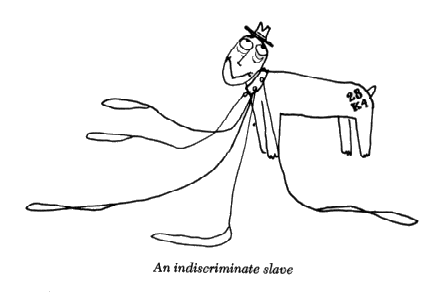
‘In far countries little men have closely studied your longing to be an indiscriminate slave. It has taught them how to become little big men with very little mental effort. These little men were not born in mansions, they rose from your ranks. They have gone hungry like you, suffered like you. And they have found a quicker way of changing masters.
‘Yes, the little men from your own ranks have found a shortcut — their method is more blatant and brutal. They tell you in so many words that you and your life, your children and family, count for nothing; that you are a feeble-minded flunky to be treated as it suits them.
‘They promise you not individual but national freedom. They say nothing of self-respect but tell you to respect the state. They promise you not a personal greatness but national greatness. Since “individual freedom” and “individual greatness” mean nothing to you, while “national freedom” and “national greatness” stimulate your vocal cords in very much the same way as bones bring water to a dog’s mouth, the sound of these words makes you cheer.
‘None of these little men pays the price that Giordano Bruno, Jesus, Karl Marx, or Lincoln had to pay for genuine freedom. They don’t love you, little man, they despise you because you despise yourself. They know you through and through, much better than Rockefeller or the Tories know you. They know your worst weaknesses, as you ought to know them. They have sacrificed you to a symbol, and you have given them the power over you. You yourself have raised up your masters and you go on supporting them even though — or perhaps because — they have cast off all masks.
‘You call them guides or redeemers, and shout hurrah, hurrah…’
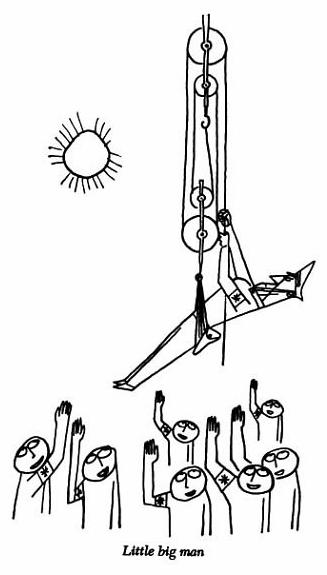
‘You’d have shaken off your oppressors long ago if you hadn’t countenanced oppression and often given it your direct support. No police force in the world would have had the power to crush you if you had an ounce of self-respect in your daily life, if you were aware, really aware, that without you, life could not go on for one hour…
‘I tell you, little man, you’ve lost all feeling for the best that is in you. You’ve stifled it. And when you find something worthwhile in others, in your children, your wife, your husband, your father or mother, you kill it. Little man, you’re small and you want to stay small.
‘How, you ask me, do I know all this? I’ll tell you.
‘I have known you, shared your experiences; I’ve known you in myself. As a physician I’ve freed you from what is small in you; as an educator I’ve often guided you in the path of integrity and openness. I know how bitterly you resist your integrity, what mortal fear comes over you when called upon to follow your own, authentic nature…
‘Not the newspaper you read, not your vicious neighbour’s opinion, but “yourself”…Deep down, you are what a deer, your God, your poet, or your philosopher is. But you think you’re a member of the VFW, your bowling club, or the Ku Klux Klan…
‘You plead for happiness in life, but security means more to you, even if it costs you your backbone or wrecks your whole life. Since you have never learned to seize upon happiness, to enjoy it and safeguard it, you lack the courage and integrity.
‘Shall I tell you, little man, what kind of man you are? You listen to commercials on the radio, advertisements for laxatives, toothpaste, shoe polish, deodorants, and so on. But you are unaware of the abysmal stupidity, the abominable bad taste of the siren’s tones calculated to catch your ear.
‘Have you ever listened closely to a nightclub entertainer’s jokes about you? About you, about himself, and your whole wretched world. Listen to your advertisements for better bowel movements and learn who and what you are.
‘Listen, little man! Every single one of your petty misdeeds throws a light on the wretchedness of human life. Every one of your petty actions diminishes the hope of improving your lot just a little more. That is ground for sorrow, little man, for deep, heart-breaking sorrow. To avert such sorrow you make silly little jokes. That’s what you call your sense of humour.
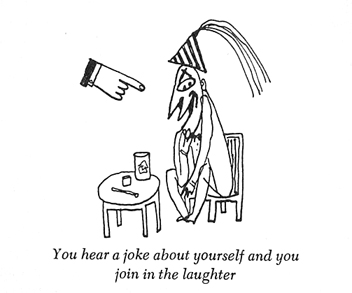
‘You hear a joke about yourself and you join in the laughter. You don’t laugh because you appreciate humour at your own expense. You laugh at the little man without suspecting that you are laughing at yourself, that the joke is on you. And all the millions of little men fail to realize that the joke is on them. Why have you been laughed at so heartily, so openly, so maliciously, down through the centuries? Have you ever noticed how ridiculous the common people are made to look in the movies?
‘I will tell you why you are laughed at, little man, because I take you seriously, very seriously.
‘Invariably you miss the truth in your thinking. You remind me of the whimsical sharpshooter who purposely misses the bull’s eye by a hair’s breadth. You disagree? I’ll prove it.
‘You could have become the master of your existence long ago if your thinking aimed at the truth. I’ll give you an example of your thinking:
‘“It’s all the fault of the Jews,” you say. “What’s a Jew?” I ask. “People with Jewish blood,” you say. “How do you distinguish Jewish blood from other blood?” The question baffles you. You hesitate. Then you say, “I meant the Jewish race.” “What’s race?” I ask. “Race? That’s obvious. Just as there’s a Germanic race, there’s a Jewish race.” “What are the characteristics of the Jewish race?” “A Jew has black hair, a long hooked nose, and sharp eyes. The Jews are greedy and capitalistic.” “Have you ever seen a southern Frenchman or an Italian side by side with a Jew? Can you distinguish between them?” “No, not really . . .” “Then what’s a Jew? His blood picture is the same as everyone else’s. His appearance is no different from that of a Frenchman or an Italian. On the other hand have you ever seen any German Jews?” “They look like Germans.” “What’s a German?” “A German is a member of the Nordic Aryan race.” “Are the Indians Aryans?” “Yes.” “Are they Nordics?” “No.” “Are they blond?” “No.” “See? You don’t even know what a Jew or a German is.” “But Jews do exist!” “Of course Jews exist. So do Christians and Moslems.” “That’s right. I meant the Jewish religion.” “Was Roosevelt a Dutchman?” “No.” “Why do you call a descendant of David a Jew if you don’t call Roosevelt a Dutchman?” “The Jews are different.” “What’s different?” “I don’t know.”
‘That’s the kind of rubbish you talk, little man. And with such rubbish you set up armed gangs that kill ten million people for being Jews, though you can’t even tell me what a Jew is.
‘That’s why you’re laughed at, why anybody with anything serious to do steers clear of you. That’s why you’re up to your neck in muck. It makes you feel superior to call someone a Jew. It makes you feel superior because you feel inferior. You feel inferior because you yourself are exactly what you want to kill off in the people you call Jews. That’s just a sampling of the truth about you, little man.
‘When you contemptuously call someone a “Jew,” your sense of your own littleness is relieved. I discovered that only recently. You call anyone who arouses too much or too little respect in you a Jew. And as if you’d been sent down to earth by some higher power, you take it on yourself to decide who is a Jew. I contest that right, regardless of whether you’re a little Aryan or a little Jew. No-one but myself is entitled to say what I am. I am a biological and cultural mongrel and proud of it; in mind and body, I am a product of all classes and races and nations. I don’t pretend to be racially or socially pure like you, or a chauvinist like you, petty fascist of all nations, races, and classes.
‘You fritter away your freedom. No one has ever asked you, little man, why you haven’t been more successful in winning freedom, or if you have won it, why you have quickly lost it to a new master.
‘“Did you hear that? He has the gall to cast doubt on democracy and the revolutionary upsurge of the workers of the world. Down with the revolutionary, down with the counter-revolutionary! Down!”
‘Take it easy, little Fuhrer of all democrats and of the world proletariat. I am convinced that your real prospects of attaining freedom depend more on the answer to that one question than on ten thousand resolutions of your party congresses.
‘All your cries of “Up” and “Down” won’t bring you one step closer to your goal, little man. You have always thought you could safeguard your freedom by standing people “up against the wall.” You’d do better to stand yourself up to a mirror . . .
‘“Down! . . .”
‘Take it easy, little man. I don’t mean to insult you, I’m only trying to show you why you’ve never been able to win freedom, or to preserve it for any length of time. Doesn’t that interest you all?
‘“Do–o–own . . .”’
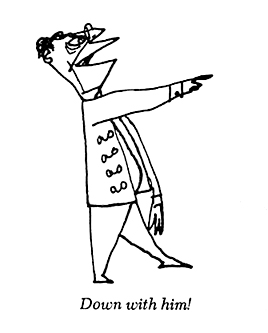
***
Take your destiny into your own hands and build your life on rock. Forget about your neighbour and look inside yourself! Your neighbour, too, will be grateful. Tell your fellow workers all over the world that you’re no longer willing to work for death but only for life. Instead of flocking to executions and shouting hurrah, hurrah, make a law for the protection of human life and its blessings. Such a law will be a part of the granite foundation your house rests on…
‘Join forces with your kind in all countries; they are like you, for better or worse. Let your child grow up as nature (or ‘God’) intended. Don’t try to improve on nature. Learn to understand it and protect it. Go to the library instead of the prize fight, go to foreign countries rather than to Coney Island. And first and foremost, think straight, trust the quiet inner voice that tells you what to do. You hold your life in your hands, don’t entrust it to anyone else, least of all to your chosen leaders. BE YOURSELF! Any number of great men have told you that.
‘“The man is stark raving mad!”
‘I know, little man, you’re very quick to diagnose madness when a truth doesn’t suit you. You regard yourself as “normal”!
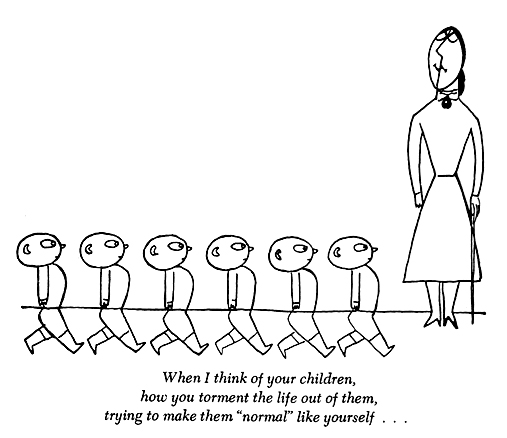
‘You’ve locked up all the lunatics and the world is run by normal people. Then who’s to blame for all the trouble? Not you, of course; you only do your duty, and who are you to have an opinion of your own? I know. You don’t have to say it again. It’s not you I’m worried about, little man! But when I think of your children, when I think how you torment the life out of them trying to make them “normal” like yourself, I almost want to come back to you and do what I can to stop your crimes. But I also know that you’ve taken precautions against that by appointing commissioners of education and child care.
***
A GLIMPSE OF THE FUTURE. I can’t tell you what your future will be. I have no way of knowing whether you’ll ever get to the moon or to Mars… Nor can I know how your space ships will take off or land, whether you will light your houses with solar energy, or whether you will be able to talk with someone in Australia or Baghdad through a slit in the wall of your room. But I can tell you what you will definitely not do in five hundred or five thousand years.
‘“Would you listen to that! He’s a crank! He can tell me what I won’t do! Is he a dictator?”
‘I’m not a dictator, little man, though, what with your smallness, I might easily have become one. Your dictators can tell you only what you can’t do in the present without ending up in a gas chamber. They can no more tell you what you will do in the distant future than they can make a tree grow faster.
‘All right. The first of all the many things you will not do in the future is to regard yourself as a little man with no opinion of his own, who says, “Anyway, who am I to . . . ?” You have an opinion of your own and in the future you will regard it as a disgrace not to know it, not to express it and stand up for it.
‘“But what will public opinion say about my opinion? I’ll be crushed like a worm if I express my own opinion!”
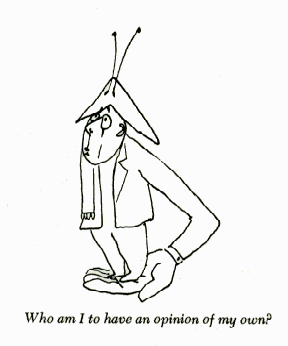
‘What you call “public opinion,” little man, is the aggregate of all the opinions of little men and women. Every little man and every little woman has inside him a sound opinion of his own and a particular kind of unsound opinion. Their unsound opinions spring from the fear of the unsound opinions of all the other little men and women. That’s why the sound opinions don’t come to light. For instance, you will no longer believe that you “count for nothing.” You will know and proclaim that you are the mainstay and foundation of this human society. Don’t run away! Don’t be afraid! It’s not so bad to be a responsible mainstay of human society.
“What then must I do in order to be the mainstay of society?”
‘Nothing new or unusual. Just go on doing what you’re already doing: till your field, wield your hammer, examine your patient, take your children out playing or to school, write articles about the events of the day, investigate the secrets of nature. You’re already doing all these things, but you think they’re unimportant and that only what Marshal Medalchest or Prince Blowhard says or does is important.
‘“You’re a dreamer, Doctor. Don’t you see that Marshal Medalchest and Prince Blowhard have the soldiers and the arms needed to make war, to mobilize me for their war, and to blow my field, my factory, my laboratory, or my office to pieces?”
‘You get yourself mobilized, your field and your factory are blown to pieces, because you shout hurrah hurrah when they mobilize you and blow your factory and field to pieces. Prince Blowhard would have neither soldiers nor arms if you really knew that a field was for growing wheat and a factory for making furniture or shoes, that fields and factories were not made to be blown to pieces, and if you stood foursquare behind your knowledge. Your Marshal Medalchest and your Prince Blowhard don’t know these things. They themselves don’t work in a field, factory, or office. They think you work not to feed and clothe your children but for the grandeur of the German or the Workers’ Fatherland…
‘“That’s all very well and good. But now they’ve made these atom bombs. A single one of them can kill hundreds of thousands of people!”
‘Use your head, little man! Do you think Prince Blowhard makes atom bombs? No, they’re made by little man who shout hurrah, hurrah instead of refusing to make them. You see, little man, it all boils down to one thing, to you and your sound or unsound thinking. And you, the most brilliant scientist of the twentieth century, if you were not a microscopically little man, you’d have thought in terms of the world and not of any nation. Your great intellect would have shown you how to keep the atom bomb out of the world; or if the logic of scientific development made such an invention inevitable, you’d have brought all your influence to bear to prevent it from being used…
‘You ask me, little man, when you will have a good, secure life. The answer is alien to your nature.
‘You’ll have a good, secure life when being alive means more to you than security, love more than money, your freedom more than public or partisan opinion; when the mood of Beethoven’s or Bach’s music becomes the mood of your whole life — you have it in you, little man, somewhere deep down in a corner of your being; when your thinking is in harmony, and no longer in conflict, with your feelings; when you’ve learned to recognize two things in their season: your gifts and the onset of old age; when you let yourself be guided by the thoughts of great sages and no longer by the crimes of great warriors: when you cease to set more store by a marriage certificate than by love between man and woman; when you learn to recognize your errors promptly and not too late, as you do today; when you pay the men and women who teach your children better than politicians; when truths inspire you and empty formulas repel you; when you communicate with your fellow workers in foreign countries directly, and no longer through diplomats; when instead of enraging you as it does today, your adolescents daughter’s happiness in love makes your heart swell with joy; when you can only shake your head at the memory of the days when small children were punished for touching their sex organs; when the human faces you see on the street are no longer drawn with grief and misery but glow with freedom, vitality, and serenity…
***
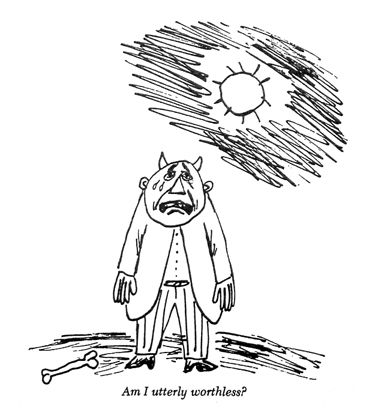
‘“Am I then utterly worthless? You don’t give me credit for one ounce of decency. You make hash out of me. But look here. I work hard, I support my wife and children, I try to lead a good life, I serve my country. I can’t be as bad as all that!”
‘I know you’re a decent, industrious, cooperative animal, comparable to a bee or an ant. All I’ve done is to lay bare the little man in you, who has been wrecking your life for thousands of years. You are great, little man, when you’re not mean and small. Your greatness, little man, is the only hope we have left. You’re great when you attend lovingly to your trade, when you take pleasure in carving and building and painting, in sowing and reaping, in the blue sky and the deer and the morning dew, in music and dancing, in your growing children, and in the beautiful body of your wife or husband; when you go to the planetarium to study the stars, to the library to read what other men and women have thought about life. You’re great when your grandchild sits on your lap and you tell him of times long past and look into the uncertain future with his sweet, childlike curiosity. You’re great, mother, when you lull your baby to sleep; when with tears in your eyes you pray fervently for his future happiness; and when hour after hour, year after year, you build this happiness in your child.
‘You’re great, little man, when you sing the good, warmhearted folk songs, or when you dance the old dances to the tune of an accordion, because folk songs are good for the soul, and they’re the same the world over. And you’re great when you say to your friend:
‘“I thank my fate that I’ve been able to live my life free from filth and greed; that I’ve been able to preserve, in all its freedom and purity, my feeling for the springtime and its gentle breezes, for the gurgling of the brook that flows past my house and the singing of the birds in the woods; that I’ve taken no part in the gossip of malicious neighbors; that I’ve been happy in the embrace of my wife or husband and have felt the stream of life in my body; that I haven’t lost my bearings in troubled times, and that my life has had meaning and continuity. For I have always hearkened to the gentle voice within me that said, ‘Only one thing matters: live a good, happy life. Do your heart’s bidding, even when it leads you on paths that timid souls would avoid. Even when life is a torment, don’t let it harden you.’”
‘And to the dictators and tyrants, the crafty and malignant, the vultures and hyenas, I cry out in the words of an ancient sage:
I have planted the banner of holy words in this world.
Long after the palm tree has withered and the rock crumbled,
long after the glittering monarchs have vanished like the dust of dried leaves,
a thousand arks will carry my word through every flood:
It will prevail.
—————————————————————
[i] I have taken the liberty of lightly editing the text to extract what I consider to be the key passages
.

